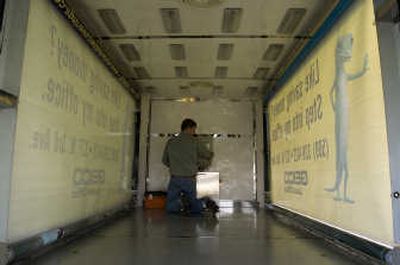Vehicles’ lighted signs draw police scrutiny

Eye-catching, lighted signs on pizza-delivery cars and scrolling, illuminated billboards on trucks driving state roads could catch the attention of law enforcement – and subject drivers to $124 fines, state police say.
The Washington State Patrol is reminding businesses that using such signs, including a growing number of mobile advertising trucks, that state law “heavily restricts” use of lighted or electrically powered signs while in motion. The law affects Spokane-based truck operator GoGreen Mobile Media, and it could call into question a common practice for at least some local pizza outlets, business representatives said.
WSP has noticed an “increase in companies” displaying advertising from moving vehicles, and such lighted devices “add to confusion and distraction for many motorists and pedestrians, creating a greater risk of collisions on our roadways,” according to a news release.
“There are many ways to advertise products that are not as hazardous or distracting as lighted messaging,” WSP Chief John Batiste said in a statement.
GoGreen started operating a bright green truck with scrolling billboards nearly a year ago, and GoMobile Advertising of Kent, Wash., which operates four similar trucks and sells them to affiliates for a Florida manufacturer, recently brought one here.
Representatives of both companies said they would comply with the law. But it appears they plan to continue scrolling ads while driving, which Melissa Van Gorkom, a WSP manager, said is off-limits.
GoGreen probably will change its hours and use the lights when parked at night, said Steve Cada, manager for Samann Investments, which runs GoGreen.
“That really doesn’t take away from our business model or what we’re trying to do,” he said. “I think we can remain within the law just by adjusting our routine.”
GoMobile had lawyers look for applicable laws, but it extrapolated that moving signs were OK as long as they weren’t lit, said Mike Seifert, vice president of sales for GoMobile.
He asserted there’s no indication the trucks, heavily used in cities such as Las Vegas, have caused accidents.
“I think we’ll change our routing a little bit,” he said, adding he doesn’t see the law affecting the business financially.
It’s difficult to tell if anyone’s been cited under the law, Van Gorkom said.
The law, filed in the late 1980s, exempts taxis. It appears it was enacted to counter attempts to put lighted ads on buses, Van Gorkom said.
It also applies to pizza deliverers, which could light their signs when parked, WSP spokesman Trooper Mark Baker said previously.
“We’re closer to mandating that they use a lit car top, and I’d hate to have my drivers be penalized because they’re doing something that we as a company ask,” said Shane Anderson, owner of eight Domino’s Pizza restaurants in Spokane.
Anderson said he hadn’t heard of the law, and lit car-top signs have been used for decades.
“Everywhere I go in the state, I see lit car tops,” he said. “All of my competition uses them.”
To WSP officers, however, equipment violations aren’t always a top priority, Van Gorkom said.
“It’s always up to officers’ discretion, but it’s put there for them to cite if they so chose,” she said.
Trucks sold by GoMobile cost about $100,000 each and run on diesel or biodiesel. GoGreen bought its trucks from a competitor.
GoMobile runs ads for Crime Stoppers, a program soliciting anonymous tips about crimes, as a form of community service, Seifert said. GoGreen would like to do something similar, Cada said.